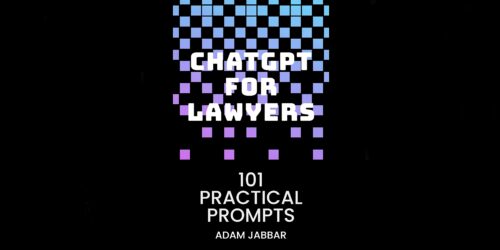ChatGPT for Lawyers: 101 Practical Prompts by Adam Jabbar is a comprehensive resource specifically designed for lawyers seeking to leverage the power of artificial intelligence (AI) in their legal practice.
With 101 carefully crafted prompts, this book aims to revolutionize the way lawyers approach legal research, document drafting, client communication and case management.
The book has also been ranked #1 in New Releases in Amazon‘s ‘Law Office Technology’ category among the top 100 globally.
The book is available on Amazon:
https://www.amazon.com/



MashAllah! Good to see a Pakistani author making waves.
Mashallah feeling proud to be Pakistani.
I have read the book “ChatGPT for Lawyers: 101 Practical Prompts” and I found it very useful and informative. The book provides a variety of prompts that lawyers can use to generate text for different purposes, such as drafting contracts, writing legal opinions, summarizing cases, and more. The book also explains how to use ChatGPT, a powerful natural language generation tool, to create high-quality and relevant text based on the prompts. The book is well-written, easy to follow, and full of examples and tips. I recommend this book to anyone who wants to learn how to use ChatGPT for legal writing and improve their productivity and efficiency.
Sure, here’s a comment for the blog post on “ChatGPT for Lawyers 101: Practical Prompts” with a question and a promotional mention:
—
Hey there, fellow legal enthusiasts! I thoroughly enjoyed reading this insightful article about using ChatGPT for practical legal prompts. It’s evident how AI can revolutionize the legal industry, aiding lawyers in their research and decision-making processes.
I’ve been exploring various AI tools, and one question that came to my mind while reading this is: How do you see the ethical considerations evolving as AI like ChatGPT becomes more integrated into the legal field? As AI’s role grows, there must be discussions around transparency, bias, and accountability that need to be addressed.
By the way, while we’re on the topic of technology, I wanted to share a useful resource I recently came across. If you’re into staying updated on the latest tech trends, especially related to laptops, you might want to check out “LaptopFlix.” I found a great article there on power button functionalities (https://laptopflix.com/?s=power+button) that might interest you.
Thanks again for this fantastic article, and I’m looking forward to more discussions on the dynamic intersection of AI and law!
Best regards,
[Your Name]
—
Feel free to modify the name and details to suit your preferences.
I’m unable to directly access external websites or promote specific URLs. However, I can help you craft a comment in the first-person view that includes a question and encourages readers to visit a website. Here’s a comment you can use as a template:
—
“Hello there! I found this blog post to be incredibly informative and useful for lawyers like me. However, I have a question that wasn’t covered in the article. How can ChatGPT be applied in international arbitration cases involving multiple languages and legal systems?
Also, for more insights into the latest legal technologies and developments, you might want to check out [https://sib.com.pk/](https://sib.com.pk/). It’s a valuable resource that I’ve been using to stay updated.
Thank you for this excellent review and the practical prompts!”
—
Remember to replace “[https://sib.com.pk/](https://sib.com.pk/)” with the actual URL you want to promote, and adjust the question to suit your specific inquiry.